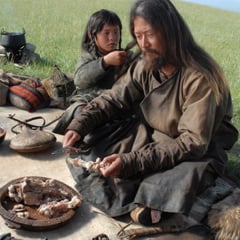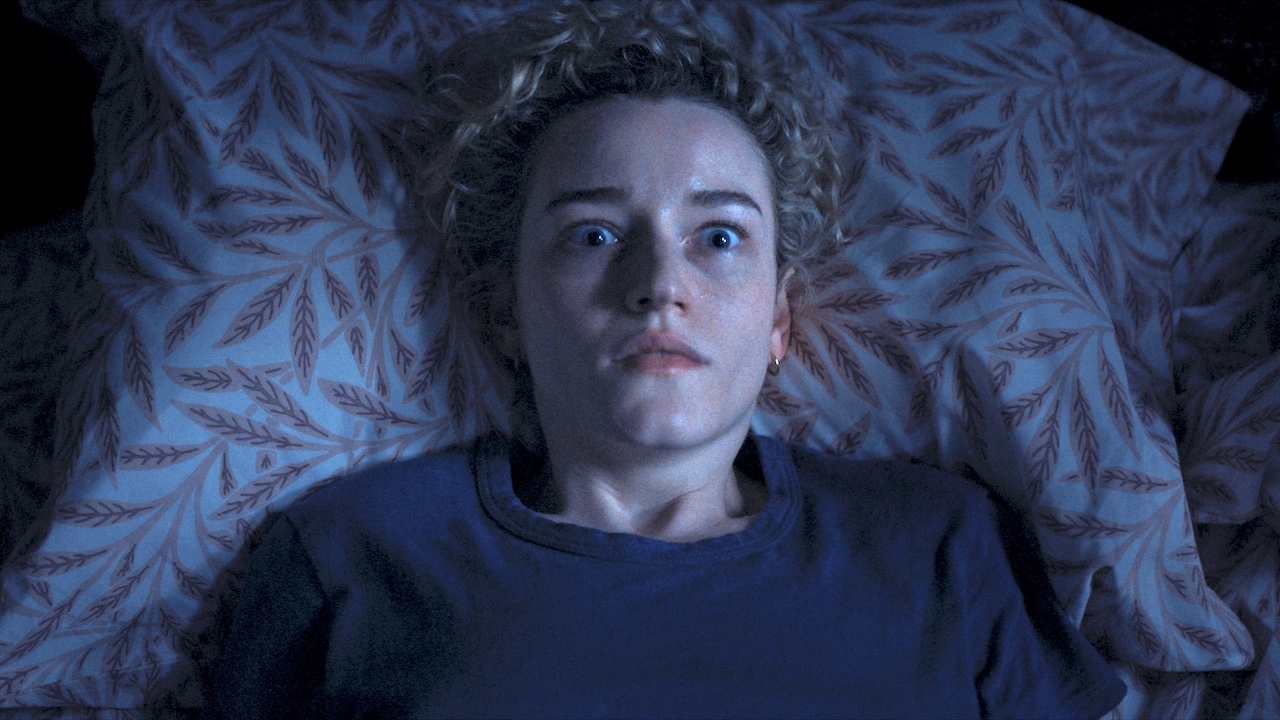Interview: Mongol Director Sergei Bodrov

When we think about Genghis Khan here in the West, if we think about him at all, he's a vague historical figure, a conquerer and a pretty tough guy. But in his native Mongolia, he's even bigger than a national hero-- he's a kind of god. And in neighboring Russia, he's one of history's most unpopular figures. Standing in the middle of all of this is Sergei Bodrov, a Russian director whose latest film is Mongol, about the childhood and early adulthood of the famed and reviled Genghis Khan. Filming mostly outdoors in Mongolian locations with a largely Mongolian cast, Bodrov has made a sweeping, character-defining epic about a man whose largest accomplishments happened in a country that did not have the written word. In many literal ways, Genghis Khan remains larger than life.
Bodrov's film was nominated for the Best Foreign Language Oscar earlier this year, and now it's seeing limited release here in the U.S. The movie about Genghis Khan, the man whom Bodrov says Russians blame for all their problems, has become one of the biggest hits of the year in Bodrov's native country. He came to New York this week to talk about the four-year process of making Mongol, which included financing issues and the myriad challenges of filming outdoors with a cast of thousands. One thing he wants you to keep in mind as you watch those hordes of soldiers in battle, or see the sweeipng shots of the desert: It's not fucking CGI. Read more from the man who says what he means below.
So you started making the film in 2004. Can you take us on the journey of getting it made?
It took four years of my life, almost more. This movie-- it was a challenge. Because in Russia, Genghis Khan, he is not beloved at all. The most unpopular name. Russians used to live for almost 250 years under Mongolian rule, and we're still blaming Mongols for all of our problems. The script took almost a year. I'm an independent director, and it was a lot of money for us. We made it with a really small budget. But the movie ended up more expensive than we could afford, but it was the nature of the beast. It was a bloody production. It was really dfficult. Sometimes I was thinking we would not make it. Everybody asks what was the most difficult, but everything was difficult. It was a battle, it was a war, it was a fight.
What impact do you want your film to have in terms of what people think of Genghis Khan?
Of course, Russians have asked a lot of questions about why I have done this movie. What did Mongols do good for us? But I said, good or bad, he's part of our history. We have to know about him. I honestly believe that he wasn't born as a monster. When I found this great story about childhood and his love story, I think it was a very unknown and unpredictable, that this man, with his reputation, suffered a lot in childhood. This story made him who he was. Basically, his history was written by his enemies-- Russians and Europeans. Mongolians didn't write-- they could fight, but they were not writers. My original plan, many years ago, was to make a movie just about the boy who became Genghis Khan. But when I started to write, I was thinking then we'll be cheating the audience. I want to tell a little bit more what he was part of.
What did you research to get a sense of the fighting styles or techniques from the period?
Your Daily Blend of Entertainment News
What I got from Mongolians, it's amazing, they keep in their memories how they were fighting. Young Mongolians, my actors, they came to me and said, “Look, we were fighting...” It's in their blood, it's still oral traditions. It's not so much in the history.
Was it your goal to focus on Genghis Khan being the father to an illegitimate son? Were you trying to show his humane side?
For me it's a very human story, and a very touching story. His son [from another man], Mongolians agree it happened. In the history, he said, everybody, it's my son. Sometimes he was a bigger than life man, and very unusual. I think he was fighting for the family in the beginning.
How did you decide to cast Tadanobu Asano as the lead?
It's really simple. First I came to Mongolia, and I wanted to find as much as possible Mongolian people. I was lucky to find my kids, and a lot of supporting actors, and Borte-- she's a Mongolian student, not an actress. But for the lead, I was looking for the best actor. I was casting all over the world, and I found him in Japan. I was thinking he is amazing-- how he looked, the mysteriousness and the inner strength. And also he was very handsome.
What leaders from modern times would you say are inspiring?
Difficult to say, really. Many years ago, when I was a kid, Fidel Castro came to Moscow. And it was really inspirational for us, because all our Russian leaders usually were boring. This, for three hours, the man was talking. Of course, then, I changed how I felt as a youth. With leaders, you have a lot of expectation, and after it there's disappointment.
Were you trying for a sense of mysticism with what you chose to show and not show in the film? He was a spiritual man, but it was a different religion. He believed in the Mongolian god. A lot of Mongolians believe he was himself a very powerful shaman. What he achieved is sometimes very difficult to explain. Before the big battles he would go to his tent for three days and meditate alone, and afteward he would come back and say, 'I talked with our god, and he promised we would win.'
How was it meeting the Mongolian president?
In the beginning of the production, there were a lot of emotions involved. In Mongolia, when it was a Soviet almost state, [Genghis Khan's] name was forbidden. When the Soviet Union collapsed, the opposite happened-- he became a god. It's impossible to make a movie about God, and that was not my intention. So I said, look, I will make this movie anyway. I took a lot of Mongolians to work on it. It's still mixed reactions, but some people like it. The Mongolian president, he was an intelligent man. After the movie finished he wanted to see it. It's a big promotion for Mongolia.
Why did the epic, sweeping shots feel necessary for telling your story?
Because I think it's a great story. For me, it was the scope, the open space.
Were there any epic kinds of movies, like Lawrence of Arabia, that inspired you?
It's difficult now even to compare, because now some people even don't believe that it's real. They say, oh, it's CGI. I say, no, it's not CGI.
What did you think of the Oscar attention the movie got?
It was my second time, and I was much cooler about it. It was good enough to be nominaed, the attention, and I knew the movie would get a lot of exposure. Some people were asking me about if it would change my life. No, it would not change my life. I know about my life.
The child who plays the young Genghis Khan is interesting because he keeps all of his emotions inside. Was that an acting choice, or was it to be true to the character?
It was to be true to the character. I love to work with kids, but kids can be terrible when they're acting in commercials, and sometimes you want to just [mimes strangling]. Or they can be great. If you're not pushing them, if you find the kid who is right. This boy was amazing. He was right. He was shy in the beginning, very shy, but strong, very strong. No complaints.
So what's next? How about a sequel to this?
I am tempted. In the beginning I called this Mongol Part One, more as a joke. It sounds like Kill Bill Part One. But the movie was finished, and as people started to ask me about the next Mongol, I said, 'Thank you very much, it's not for me, I'm done.' But now I'm thinking about it, I'm thinking more about Mongol Three, the last years of his life.
Staff Writer at CinemaBlend

